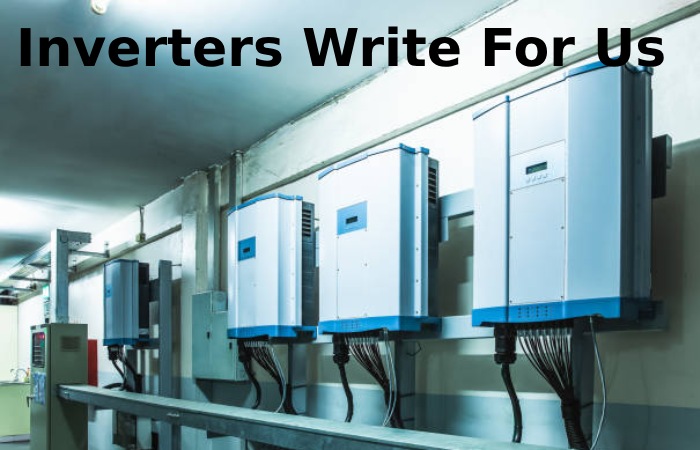Inverters Write For Us
Inverters Write For Us – An inverter is an electronic device that adapts direct current (DC) electricity into alternating (AC). It is crucial in various electrical and electronic systems, especially when using AC power sources from DC input, such as solarpower systems, uninterruptible power supplies (UPS), electric vehicles, and household appliances.
Information Tech Web was founded in 2022. Informationtechweb has come a long way since its beginning in the United States. At a time when doubt is at its peak and information flows more and more complex, informationtechweb.com is dedicated today, even more than yesterday, to understanding the great news and innovations in the categories: Automotive, Technology, Culture, Business, Marketing, Gadgets, Sports, Beauty, Games and more. You can mail us at contact@informationtechweb.com
What is an Inverter? And How Does It Work?
An inverter works by converting direct current (DC) electricity into alternating current (AC) electricity. It operates through a series of electronic components and processes. First, it takes the DC input, typically from a battery, solar panel, or other DC power source. Then, the inverter uses electronic switches, such as transistors or insulated gate bipolar transistors (IGBTs), to rapidly switch the polarity of the DC voltage, creating a pulsating DC waveform. This pulsating DC is then passed through an output filter that smoothens the waveform, resulting in a close approximation of the desired AC sine wave.
The inverter’s control circuitry precisely times these switches to generate the desired AC frequency and voltage level. Some inverters also monitor the output and adjust their operation to maintain stable and clean AC power. It transformed AC power and can operate various devices, from household appliances to industrial machinery. It makes inverters essential in various applications, including renewable energy systems, UPS units, electric vehicles, etc.
We provide opportunities for guest posting on contact@informationtechweb.com
Types of Inverters
Inverters come in various types, each designed for specific applications and operating conditions. Here are some common types of inverters:
1. Pure Sine Wave Inverter (PSW):
- Produces a smooth and clean AC waveform that closely mimics grid power.
- Suitable for powering sensitive electronics, including computers, TVs, and medical equipment.
- It is ideal for most residential and commercial applications.
2. Modified Sine Wave Inverter (MSW):
- Generates an AC waveform that is not as smooth as a pure sine wave.
- It may not be suitable for all types of sensitive equipment, as it can cause some electronic devices to run less efficiently or produce audible noise.
- Generally more affordable than pure sine wave inverters.
- They are used in more straightforward applications where compatibility with sensitive electronics is not a concern.
3. Square Wave Inverter:
- Produces a square-shaped AC waveform, the most straightforward and least refined waveform.
- They are rarely used today due to their limited compatibility with most appliances and electronics.
- Typically found in older or low-cost inverters.
4. Grid-Tie Inverter:
- Used in grid-connected solar power systems.
- Changes DC electricity from solar panels into AC electricity that can be nourished back into the grid or used in the building.
- Synchronizes with the grid’s frequency and voltage to ensure safe and efficient energy transfer.
5. Off-Grid Inverter:
- They are designed for standalone or off-grid power systems, such as remote cabins or RVs.
- Converts DC power from batteries or renewable sources (like solar or wind) into AC power for appliances and devices.
- It often includes battery charging and management functions.
6. Micro-Inverter:
- Typically used in residential solar panel installations.
- Each solar panel has a micro-inverter, which converts DC power to AC power at the board.
- Offers advantages like improved energy harvest and system monitoring.
7. String Inverter:
- Commonly used in larger solar installations, both residential and commercial.
- Converts DC power from a series of connected solar panels (a “string”) into AC power.
- More cost-effective than micro-inverters but may be less efficient in partial shading or panel mismatch situations.
8. Three-Phase Inverter:
- Used in industrial and commercial applications and some residential settings.
- Converts DC power to three-phase AC power, common in many industrial motors and equipment.
- Provides a more balanced power output for three-phase loads.
9. Voltage Source Inverter (VSI):
- Used in motor drives, electric vehicles, and renewable energy systems.
- Maintains a constant voltage output regardless of load variations.
- Commonly used in variable-speed motor control applications.
10. Current Source Inverter (CSI):
- Less common than VSIs and used in specific applications like HVDC (high-voltage direct current) transmission systems.
- Maintains a constant current output, which can be advantageous in specific scenarios.
The choice of inverter type depends on the application’s specific requirements, including the loads to be powered, the quality of AC power needed, and the system’s overall design.
How to Update Your Articles?
E-mailing us at contact@informationtechweb.com is the quickest way to reach us.
Why Write for Information Tech Web – Inverters Write For Us
 Writing for Information Tech Web can expose your website to customers looking for Inverters.
Writing for Information Tech Web can expose your website to customers looking for Inverters.- Information Tech’s Web presence is on Social media, and they will share your article with the Inverters-related audience.
- You can reach out to Inverters enthusiasts.
Search Terms Related to Inverters Write For Us
- Power electronic
- Direct current (dc)
- Alternating current (ac)
- Rectifiers
- Voltage
- Power
- Oscillators
- High-voltage direct current
- Square wave
- Sine wave
- Pulse-width-modulated
- Total harmonic distortion (thd)
- Boost converter
- Line-frequency transformer
- Square waves
- Switch-mode power supply
- Mosfets
- Uninterruptible power supply
- Best inverter for home
- Best inverter with battery for home
- Luminous inverter
- Solar inverter
- Best inverters
- Exide inverter
- Microtek inverter
- Best inverter price
Search Terms for Inverters Write For Us
Write For Us Inverters
Inverters Guest Post
Contribute Inverters
Inverters Submit Post
Inverters to submit an article
Guest author Inverters
Inverters Write For Us
Become a guest blogger on Inverters
Inverters writers wanted
Inverters suggest a post
Submit Post Inverters
Guest Post Inverters
Article Guidelines on Information Tech Web – Inverters Write for Us
- Information Tech Web welcomes fresh and unique content related to Inverters.
- Information Tech Web allows at least 500+ words related to Inverters.
- The editorial team of Information Tech Web does not encourage promotional content related to Inverters.
- For publishing an article at Information Tech Web, please e-mail us at contact@informationtechweb.com
- Information Tech Web allows articles related to Computers, Technology, Economy, Forex/Trading, Crypto, Marketing, Business, Etc.

